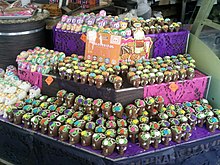Calavera
Calavera can also refer to any artistic representations of skulls or skeletons, such as those in the prints of José Guadalupe Posada, or to gifts or treats in relation to the Day of the Dead.
[1] Some widely known calaveras are created with cane sugar, decorated with items such as colored foil, icing, beads, and sometimes objects such as feathers.
[2] Traditional methods for producing sugar skulls with molds have been in use for a long time,[3] though the first known mention of the sale of skeletal figures dates to the 1740s.
It has been argued that the tradition has roots in indigenous celebrations, by groups including the Aztec, Mayan, and Toltec commemorations.
During the 19th and 20th centuries, caricaturists, most eminently Manual Manilla and José Guadalupe Posada made influential calaveras, which were accompanied by satirical, rhymed commentaries.
[4][9] During Day of the Dead, skulls and skeletons are created from many materials such as wood, sugar paste, nuts, chocolate, etc.
Production can be a lengthy process: a craftsman who creates elaborate calaveras might spend four to six months producing and decorating the skulls for a season.
The most famous place to purchase sugar skulls and related confections (chocolate, marzipan, candied vegetables, etc.)
[citation needed] Poetry written for the Day of the Dead are known as Literary calaveras, and are intended to humorously criticize the living while reminding them of their mortality.
Today literary calaveras are given to family members and friends; published and illustrated versions satirize celebrities and famous organizations in the press.
Additionally, drawings of fictional dead personalities often contained text elements providing details of the deaths of various individuals.




